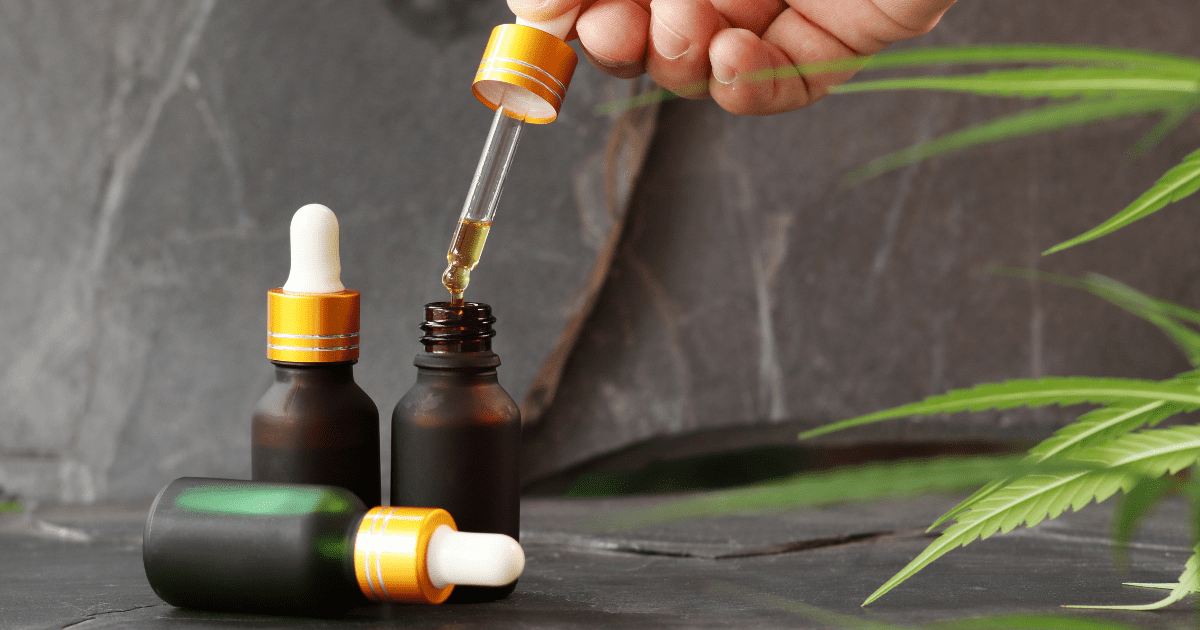Cannabis News
Does CBD Oil Help With Sleep? Taking CBD Oil For Sleep
In recent years, CBD oil has emerged as a popular natural remedy for various health issues, including sleep disturbances. As more people seek alternative solutions to improve their sleep quality, the potential benefits of CBD for sleep have become a subject of interest and discussion. In this article, we’ll explore the relationship between CBD oil and sleep, examining its effects, possible benefits, and what you should know before considering it as a sleep aid.
Whether you’re struggling with insomnia, restless nights, or simply seeking a way to enhance your sleep routine, let’s delve into the fascinating world of CBD oil and its potential to promote a more restful slumber.
What is CBD Oil?
CBD oil, short for cannabidiol oil, is a natural extract derived from the cannabis plant. It is one of over a hundred compounds found in cannabis, known as cannabinoids. However, unlike tetrahydrocannabinol (THC), which is another well-known cannabinoid found in cannabis, CBD is not psychoactive. In other words, it does not produce the “high” feeling typically associated with marijuana use.
CBD is usually obtained from hemp plants, a variety of cannabis with low THC levels, making it legal in many countries, including the United States and Canada, as long as it meets specific regulations.
The extraction process involves isolating CBD from the plant material and then diluting it with a carrier oil, such as coconut oil or hemp seed oil, to create CBD oil. The resulting product contains a concentrated form of CBD that can be consumed orally or applied topically.
CBD oil has gained popularity for its potential therapeutic properties. It is often used as a natural remedy for various health issues, such as anxiety, pain, inflammation, and sleep disturbances. While scientific research on CBD is still ongoing, there is growing evidence to support its potential benefits in promoting overall well-being. However, it’s essential to note that individual responses to CBD may vary, and it’s advisable to consult a healthcare professional before using CBD oil, especially if you have any existing medical conditions or are taking other medications.
How Does CBD Oil Work?
CBD oil works by interacting with the body’s endocannabinoid system (ECS), a complex network of receptors and neurotransmitters found throughout the body. The ECS plays a crucial role in regulating various physiological processes and maintaining homeostasis, which is the body’s state of internal balance.
The ECS consists of two main types of receptors: CB1 receptors, primarily found in the brain and central nervous system, and CB2 receptors, mainly located in the immune system and peripheral tissues. CBD does not directly bind to these receptors like THC does; instead, it influences the ECS in more indirect ways.
CBD is believed to interact with CB1 and CB2 receptors indirectly, modulating their activity and affecting the release of neurotransmitters. It also interacts with other receptors and channels in the body, including serotonin receptors, which are involved in mood regulation, and vanilloid receptors, which play a role in pain perception.
One of the primary functions of the ECS is to regulate the body’s response to stress and maintain a balanced state, both mentally and physically.
By interacting with the ECS, CBD may have various effects, such as:
- Pain Relief: CBD’s interaction with receptors involved in pain perception may help alleviate discomfort and reduce inflammation.
- Anxiety and Stress Reduction: CBD may influence serotonin receptors, which can contribute to its potential anti-anxiety and stress-relieving effects.
- Sleep Regulation: CBD’s impact on the ECS and its potential calming properties could be beneficial for promoting better sleep and addressing sleep-related issues.
- Neuroprotective Effects: Some studies suggest that CBD may have neuroprotective properties, potentially benefiting conditions related to brain health.
- Anti-Inflammatory Benefits: CBD’s interaction with the ECS and other receptors may help reduce inflammation in the body.
It’s important to note that while there is a growing body of research on CBD’s potential benefits, more studies are needed to fully understand its mechanisms of action and the extent of its effects on various health conditions. Additionally, individual responses to CBD can vary, and the optimal dosage may differ from person to person. If you’re considering using CBD oil for specific health concerns, it’s advisable to consult with a healthcare professional to determine the most appropriate approach for your needs.
How Can CBD Oil Help With Sleep?
CBD oil may potentially help with sleep in several ways:
- Reducing Anxiety and Stress: Anxiety and stress are common factors that can disrupt sleep patterns and lead to insomnia. CBD has been studied for its potential anxiolytic (anxiety-reducing) properties. By interacting with serotonin receptors in the brain, CBD may promote a sense of calm and relaxation, which can be beneficial for those struggling with sleep due to anxious thoughts or stress.
- Promoting Relaxation: CBD’s interaction with the endocannabinoid system (ECS) may help regulate various physiological processes, including those involved in relaxation and sleep. By influencing receptors in the brain and body, CBD may contribute to a more relaxed state, making it easier for individuals to fall asleep.
- Addressing Pain and Discomfort: Chronic pain or discomfort can significantly impact sleep quality. CBD’s potential analgesic (pain-relieving) properties may help reduce pain and inflammation, potentially leading to improved sleep for individuals dealing with pain-related sleep disturbances.
- Regulating Sleep-Wake Cycle: The ECS plays a role in regulating the sleep-wake cycle. By interacting with ECS receptors, CBD may help promote a more consistent and balanced sleep-wake rhythm, leading to better overall sleep patterns.
- Improving REM Sleep: Some studies suggest that CBD may increase the duration of rapid eye movement (REM) sleep, which is a crucial stage of the sleep cycle associated with dreaming and cognitive restoration. Improving REM sleep could result in more restorative and refreshing sleep.
- Addressing Underlying Conditions: In cases where sleep disturbances are related to certain medical conditions, CBD’s potential therapeutic properties may indirectly help improve sleep by addressing the underlying issues. For example, if pain or anxiety is causing sleep problems, CBD’s effects on pain and anxiety reduction may lead to better sleep outcomes.
It’s important to note that while there is growing evidence supporting CBD’s potential to aid sleep, more research is needed to fully understand its mechanisms and effects on various sleep-related issues. Additionally, individual responses to CBD may vary, and not everyone may experience the same sleep-improving benefits.
If you are considering using CBD oil for sleep, it’s essential to start with a low dosage and gradually increase it if needed. It’s also advisable to consult with a healthcare professional to ensure that CBD is suitable for your specific sleep concerns and to determine the appropriate dosage and formulation for your needs.
How to Take CBD Oil
Taking CBD oil for sleep can be a straightforward process, but it’s essential to use it safely and effectively.
Here are some steps to guide you on how to take CBD oil for sleep:
- Choose a High-Quality CBD Oil: Select a reputable CBD oil product from a trusted brand. Look for products that provide third-party lab test results, ensuring that you’re getting a high-quality and accurately labelled CBD product.
- Consult with a Healthcare Professional: Before starting any new supplement, including CBD oil, it’s crucial to consult with a healthcare professional, especially if you have existing medical conditions or are taking other medications. They can provide personalized advice based on your health status.
- Determine the Right Dosage: The optimal dosage of CBD for sleep can vary from person to person. It’s advisable to start with a low dose and gradually increase it until you find the dosage that works best for you. Typical starting doses can range from 10mg to 25mg, taken once or twice daily.
- Time Your CBD Dose: For sleep purposes, many people prefer taking CBD oil approximately 30 minutes to an hour before bedtime. This allows the CBD to take effect when you’re ready to sleep and potentially promote a sense of relaxation before bedtime.
- Sublingual Administration: CBD oil is commonly taken sublingually, which means placing the desired dose of CBD oil under the tongue and holding it there for about 60-90 seconds before swallowing. This method allows for faster absorption into the bloodstream, making the effects more noticeable.
- Start Slowly: When you begin using CBD oil for sleep, it’s essential to monitor its effects carefully. Pay attention to how your body responds to different dosages and adjust as necessary. Some people may experience benefits with lower doses, while others may require higher amounts.
- Be Consistent: Consistency is key when using CBD for sleep. It may take some time for your body to adjust to CBD and for you to notice significant improvements in your sleep quality. Stick to a regular dosing schedule for a few weeks before evaluating its effectiveness.
- Keep a Sleep Journal: Consider keeping a sleep journal to track your sleep patterns, the dosage of CBD oil you’re taking, and how you feel upon waking. This can help you gauge the effects of CBD oil on your sleep quality over time.
Remember that individual responses to CBD can vary, and it’s essential to find the approach that works best for you. If you experience any adverse effects or have concerns about using CBD, consult your healthcare professional for further guidance.
Disadvantages of Taking CBD Oil For Sleep
While CBD oil has gained popularity as a potential natural remedy for sleep-related issues, there are some disadvantages and considerations to keep in mind:
- Limited Research: While there is a growing body of research on CBD and its potential benefits, including for sleep, the scientific evidence is still limited, and more comprehensive studies are needed to fully understand its long-term effects on sleep quality and overall health.
- Individual Variability: CBD’s effects on sleep can vary from person to person. While some individuals may experience improvements in sleep quality, others may not notice significant changes or may even experience unwanted side effects.
- Potential Side Effects: CBD is generally well-tolerated, but some people may experience side effects, including dry mouth, diarrhea, changes in appetite, and fatigue. These side effects are typically mild and temporary, but it’s essential to be aware of them.
- Drug Interactions: CBD can interact with certain medications by affecting how they are metabolized in the body. If you are taking other medications, especially those processed by the liver, consult with your healthcare professional before using CBD to avoid potential interactions.
- Regulatory Concerns: The CBD market is not yet fully regulated, and the quality of products can vary. It’s essential to choose CBD oil from reputable and trusted sources to ensure you’re getting a safe and accurately labelled product.
- Legal Considerations: The legal status of CBD can vary from country to country and even within different states or regions. Before purchasing and using CBD oil for sleep, be aware of the local laws and regulations regarding CBD products.
- Tolerance and Dependency: Some individuals may develop a tolerance to CBD over time, requiring higher doses to achieve the same effects. Additionally, while CBD is not considered addictive, there is a potential risk of psychological dependency if used excessively or inappropriately.
- Unknown Long-Term Effects: Since CBD has gained popularity relatively recently, its long-term effects on the body and sleep patterns are not yet fully understood. Caution should be exercised when using CBD regularly over extended periods.
- Expense: High-quality CBD products can be costly, and using them regularly as a sleep aid may add to your expenses over time.
As with any supplement or health product, it’s essential to weigh the potential benefits against the disadvantages and consider individual factors before incorporating CBD oil into your sleep routine. If you have any health concerns or are taking other medications, consult with a healthcare professional before using CBD to ensure it is safe and appropriate for your specific situation.
Important Things to Know If You Take CBD Oil For Sleep
If you’re considering taking CBD oil for sleep, here are some important things to know to ensure a safe and effective experience:
- Consult with a Healthcare Professional: Before starting any new supplement, including CBD oil, it’s crucial to talk to your healthcare professional, especially if you have existing health conditions, are pregnant or breastfeeding, or are taking other medications. They can provide personalized advice and help you determine if CBD is suitable for your individual needs.
- Choose a Reputable Product: Select a high-quality CBD oil product from a trusted and reputable brand like Keoni CBD oil or UNO CBD oil. Look for products that provide third-party lab test results, ensuring that you’re getting a safe and accurately labelled CBD product.
- Start with a Low Dosage: Begin with a low dosage of CBD oil and gradually increase it until you find the dosage that works best for you. Starting low allows you to gauge your body’s response to CBD and minimize the risk of adverse effects.
- Understand the Different Types of CBD: CBD products come in various forms, including full-spectrum, broad-spectrum, and CBD isolate. Full-spectrum products contain all the cannabinoids found in the hemp plant, including trace amounts of THC. Broad-spectrum contains multiple cannabinoids but no THC, while CBD isolate is pure CBD. Consider which type of CBD oil aligns with your preferences and needs.
- Timing Matters: For sleep purposes, many people prefer taking CBD oil about 30 minutes to an hour before bedtime. This allows enough time for CBD to take effect, potentially promoting relaxation and improving sleep quality.
- Be Patient and Consistent: CBD’s effects may not be immediately noticeable, and it may take time for your body to adjust. Be patient and consistent with your CBD oil regimen, giving it a few weeks to observe any changes in your sleep patterns.
- Keep a Sleep Journal: To track your progress, consider keeping a sleep journal where you record your sleep quality, the dosage of CBD oil you’re taking, and any observations upon waking. This can help you assess the effectiveness of CBD for your sleep over time.
- Potential Side Effects: While CBD is generally well-tolerated, some individuals may experience mild side effects such as dry mouth, diarrhea, changes in appetite, or fatigue. If you experience any adverse effects, discontinue use and consult with your healthcare professional.
- Avoid Driving or Operating Machinery: CBD may cause drowsiness in some individuals. If you feel drowsy or sedated after taking CBD, avoid driving or operating heavy machinery until you know how CBD affects you.
- Stay Informed about Legalities: The legality of CBD can vary depending on your location. Stay informed about local laws and regulations regarding the use and possession of CBD products.
By understanding these essential points and taking a cautious and informed approach, you can make an informed decision about using CBD oil for sleep and potentially enjoy its sleep-improving benefits more effectively and safely.
Daily Edibles is the Best Place to Buy CBD Oil Online in Canada
In the vast and diverse land of Canada, where the majestic mountains kiss the sky, and the shimmering lakes stretch as far as the eye can see, there lies a hidden gem for those seeking the wonders of CBD oil. Amidst the bustling cities and serene countryside, one name echoes through the cannabis community – Daily Edibles.
Renowned as the best place to buy CBD oil online in Canada, Daily Edibles stands as a beacon of quality, trust, and excellence. With an unrivalled selection of premium CBD products, carefully curated to cater to every need and desire, Daily Edibles offers a sanctuary of wellness, where seekers of natural remedies find solace.
From the bustling metropolis of Toronto to the serene landscapes of Vancouver Island, [Business Name] has become the go-to destination for those yearning to experience the transformative potential of CBD oil, embracing its gentle embrace to find balance, harmony, and restful sleep in the heart of this great nation.
References
Fletcher, J. (2019, July 26). A comparison of CBD and THC. Medical News Today. Available at: https://www.medicalnewstoday.com/articles/325871
Government of Canada. (2022). Cannabis Regulations. Available at: https://laws-lois.justice.gc.ca/eng/regulations/sor-2018-144/FullText.html
Carter, A. (2019, May 17). A Simple Guide to the Endocannabinoid System. Healthline. Available At: https://www.healthline.com/health/endocannabinoid-system
UNO CBD Gummies. (2023, September 1). Buy UNO CBD Oil Online. Available at: https://unocbd.com/product-category/uno-cbd-oil/
Shannon, S. (2019, January 7). Cannabidiol in Anxiety and Sleep: A Large Case Series. US National Library of Medicine National Institutes of Health. Available at: https://www.ncbi.nlm.nih.gov/pmc/articles/PMC6326553/



